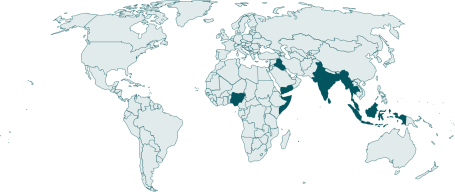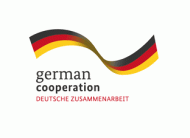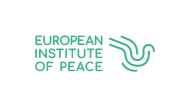The Weathering Risk Peace Pillar
Why it matters:
Finding sustainable solutions for peace requires integrating climate and environmental resilience into peace programming
Evidence from around the world shows that climate and environmental change are closely interlinked with conflict. Climate change and other environmental challenges can contribute to increased conflict and insecurity along indirect pathways, such as undermining livelihood conditions, and via intermediate factors, such as governance or inequality. As a result, those working to improve social cohesion, peace and security must integrate ways to build resilience to the impacts of a changing climate and environmental security into peace programming. Ensuring it is a core consideration of preventing, mitigating and resolving violent conflicts is essential. This not only enables sustainable solutions for peace, but also provides an opportunity to bring people together to tackle the challenges they face. When undertaken in a conflict-sensitive manner, mainstreaming climate and environmental challenges into peace programming can act as an entry point or even a catalyst for dialogue, helping to build trust between conflicting parties.
What we do:
Integrating climate and environmental security into peace programming in regions severely affected by conflict and climate risks
In partnership with experienced peacebuilding and peacemaking organisations, the Weathering Risk Peace Pillar has responded to these challenges by testing whether integrated climate, environment and peace interventions can function in Iraq, Yemen, Somalia, Nigeria and the Bay of Bengal and the value of integrated approaches. The projects incorporate climate and environmental considerations into their consultations, dialogues and mediation work. Guided by the analytical approach of Weathering Risk, the Peace Pillar is demonstrating that integration is not only possible but also makes strategic sense. Through and from implementation, the Peace Pillar shows how integration can generate greater value and impact in some of the world's most fragile settings where siloed approaches fall short. A cross-project analysis of recent interim project evaluations distils five strategic insights:
- Shared environmental risks can drive cooperation;
- Resilience is a capacity, not a fixed deliverable;
- Local grounding delivers relevance and legitimacy;
- Dialogue and action must reinforce each other;
- Integration multiplies impact.
What is emerging is not just promising but an evidence-based proof of concept that provides practical guidance for designing peace programming that is better able to adapt and strengthen peace and climate resilience in some of the world's most protracted conflicts.
Monitoring and evaluating the impact of our work and generating evidence for peace
To better understand the value of integrated peace programming, the Peace Pillar monitors and evaluates the impact of its project interventions across its different peace, climate and environmental dimensions. To ensure empirical learning, the results of these outcome evaluations are integrated into implementation to ensure adaptive and context responsive successful interventions. The collected lessons learned, best practices and insights are regularly shared with practitioners and policy makers to develop a growing evidence base, enabling more targeted and systematic integrated peace programming in the future.
Who:
The Peace Pillar is supported by the German Federal Foreign Office and implemented by adelphi research in partnership with the Berghof Foundation, the Centre for Humanitarian Dialogue (HD) and the European Institute of Peace (EIP).
When and where:
The initiative was launched in January 2022. Peace Pillar projects are being implemented in Iraq, Yemen, Somalia, Nigeria and the Bay of Bengal.

Projects:
- Strengthening Iraqi Capacities to Respond to Climate Risks and their Impact on Existing Conflict Dynamics | Berghof Foundation
Iraq is one of the most vulnerable countries to climate change. For decades, the country has experienced different conflicts along with their lasting impacts. Against the backdrop of repeated cycles of intense violent conflicts and insecurity, there is an acute risk that conflict dynamics will worsen as the impacts of climate change become more severe. Combined, these trends will continue to undermine the Iraqi population’s ability to build climate resilience. This project, currently ongoing in five districts across five governorates, works to strengthen Iraqi capacities to respond to climate risks and their impact on conflict dynamics. Together with Berghof’s Iraqi partner Peace Paradigms Organisation (PPO), we conduct extensive research to identify and analyse the impact of climate change on local conflict dynamics. This knowledge is used as a starting point for climate-informed peace-building interventions, focusing on conflict-sensitive climate adaptation and climate-focused mediation and dialogue.
For more information, visit the project page.
- Environmental Pathways for Reconciliation Yemen | EIP
Since the escalation of conflict in Yemen in 2014, the country has been grappling with mounting economic, humanitarian, and environmental crises. Scarcity of water and food insecurity are ubiquitous across the country, along with other environmental challenges. Yemen’s environmental crisis is worsening with climate change, which causes drier seasons and more frequent extreme weather events such as flash floods.
Building on an existing engagement to support inclusive peace and reconciliation in Yemen, the Environmental Pathways for Reconciliation in Yemen (EPfR) project engages with different levels of Yemeni society – from civil society to political actors – to identify and address the impact of Yemen’s environmental crisis on conflict dynamics. The project aims to support the development of locally-led approaches to prevent and resolve environment-related tensions, as well as build resilience against both conflict and climate risks.
For more information, visit the project page.
- Infrastructures for Peace and Environmental Peacebuilding in Hirshabelle and Galmudug States, Somalia | Berghof Foundation
Somalia is a hotspot for compound climate security threats, with disaster risks, protracted conflict, and severe climate change vulnerability combining to destabilise the country. Recurring drought has particularly exacerbated the conflict as vital resources have grown scarcer.
Building on previous work in the region, the Berghof Foundation is contributing to the constructive transformation of cycles of conflict, climate change, and environmental degradation. The project is being carried out in Hirshabelle and Galmudug, developing inclusive and climate-conscious strategies to address these challenges. The project aims to build community resilience, support conflict transformation in areas most affected by protracted violence, and strengthen the capacity of formal and informal institutions to engage in environmentally informed peacebuilding.
For more information, visit the project page.
- Multi-level Approaches for Sustainable Peace in Nigeria’s Middle Belt (Benue, Plateau and Nasarawa States) | HD
Farmer-herder conflicts and disputes over natural resources have killed thousands in Nigeria in recent years. In addition, natural disasters and worsening environmental conditions have displaced hundreds of thousands. The effects of climate change and conflict are particularly acute in the Middle Belt, known as the “breadbasket” of Nigeria.
To build people’s resilience against future climate and conflict risks, this project facilitates dialogues to prevent and resolve natural resource and climate-related conflicts between communities; strengthens the sustainability of natural resource peace agreements; and builds the capacity of local stakeholders on climate-related actions that promote adaptation and resilience among communities affected by climate change and conflict.
Building trust and confidence between conflict parties and communities is a priority of these dialogues, ultimately aiming to improve peaceful approaches to resource sharing and reducing the potential for conflict. For example, following mediation by HD, two communities from the Konshisha and Oju communities in the state of Benue reached a peace agreement on the shared use of water, farmland, forests and other resources, and the joint adaptation to climate change.
For more information, visit the project page.
- Bay of Bengal Maritime Dialogue | HD
Environmental degradation, depletion of fish stocks, and climate change are severely affecting the Bay of Bengal. A high dependency on the marine environment of the Bay, one of the most densely populated regions of the world, is posing a serious threat to the littoral states in terms of food security, livelihoods and economic development. Competition for dwindling resources can exacerbate existing tensions, potentially leading to conflicts over access to marine resources.
To prevent the escalation of conflict over marine resources, the project sets up and facilitates spaces for dialogue between officials, regional leaders, maritime experts, and coastal communities, building a mechanism to manage disputes that arise. Confidence-building measures and standard operating principles will be adopted by littoral states with engagement from the governments of India, Myanmar, Thailand, Sri Lanka, Bangladesh, Malaysia, and Indonesia.
For more information, visit the project page.
Driving dialogue between geographies
Driving dialogue between geographies | Weathering Risk Peace Pillar
Importance of engaging local actors
Importance of engaging local actors | Weathering Risk Peace Pillar
Generating evidence for peace
Generating evidence for peace | Weathering Risk Peace Pillar
Listen to how the Peace Pillar is integrating climate security into peacebuilding:





Share on

